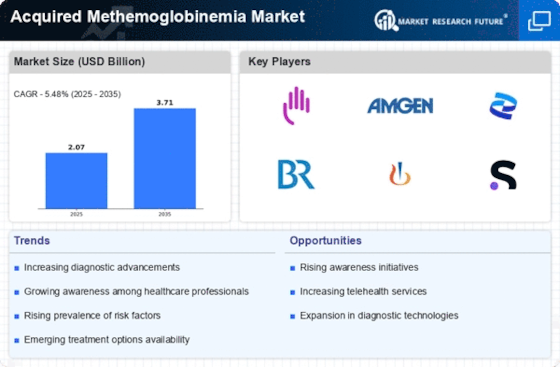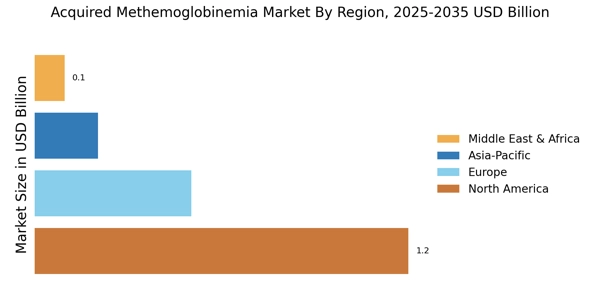Growing Focus on Patient-Centric Care
The growing focus on patient-centric care is influencing the Acquired Methemoglobinemia Market significantly. Healthcare providers are increasingly prioritizing individualized treatment plans that cater to the specific needs of patients suffering from methemoglobinemia. This shift is driven by a broader trend towards personalized medicine, which emphasizes tailored therapies based on genetic and environmental factors. As a result, pharmaceutical companies are motivated to develop targeted therapies that address the unique characteristics of methemoglobinemia in different patient populations. This approach not only enhances treatment efficacy but also improves patient satisfaction and adherence to therapy, thereby fostering growth in the Acquired Methemoglobinemia Market.
Rising Research and Development Investments
Rising investments in research and development are propelling the Acquired Methemoglobinemia Market forward. Pharmaceutical companies and research institutions are increasingly allocating resources to explore new treatment modalities and improve existing therapies for methemoglobinemia. This trend is supported by the growing recognition of the condition's impact on public health and the need for effective management strategies. Collaborative efforts between academia and industry are also on the rise, leading to innovative solutions and enhanced understanding of the disease. As R&D investments continue to grow, the market is likely to witness the emergence of novel therapies and improved diagnostic methods, further driving the Acquired Methemoglobinemia Market.
Regulatory Support for Treatment Innovations
Regulatory bodies are increasingly supporting innovations in the treatment of acquired methemoglobinemia, which serves as a significant driver for the Acquired Methemoglobinemia Market. Initiatives aimed at expediting the approval process for new therapies and diagnostic tools are becoming more common. This regulatory support encourages pharmaceutical companies to invest in research and development, leading to the introduction of novel treatment options. The market is witnessing a surge in clinical trials focused on methemoglobinemia, with several promising candidates in the pipeline. As these innovations receive regulatory backing, they are likely to enhance treatment efficacy and patient outcomes, thereby stimulating growth in the Acquired Methemoglobinemia Market.
Technological Advancements in Diagnostic Tools
Technological advancements in diagnostic tools are transforming the landscape of the Acquired Methemoglobinemia Market. Innovations such as point-of-care testing and advanced spectrophotometry are enabling quicker and more accurate diagnosis of methemoglobinemia. These advancements not only facilitate timely intervention but also improve patient management strategies. The market is experiencing a shift towards more sophisticated diagnostic solutions, which are essential for effective treatment planning. As healthcare providers increasingly adopt these technologies, the demand for reliable diagnostic tools is expected to rise. This trend is likely to enhance the overall efficiency of healthcare systems, thereby positively impacting the Acquired Methemoglobinemia Market.
Increasing Incidence of Acquired Methemoglobinemia
The rising incidence of acquired methemoglobinemia is a notable driver in the Acquired Methemoglobinemia Market. Factors such as exposure to certain medications, chemicals, and environmental pollutants contribute to this increase. Reports indicate that cases of methemoglobinemia have been on the rise, particularly in regions with high industrial activity. This trend necessitates enhanced awareness and treatment options, thereby expanding the market. The prevalence of this condition is expected to influence healthcare policies and funding, leading to increased research and development efforts. As healthcare providers become more vigilant in diagnosing and treating this condition, the demand for effective therapies and diagnostic tools is likely to grow, further propelling the Acquired Methemoglobinemia Market.

















